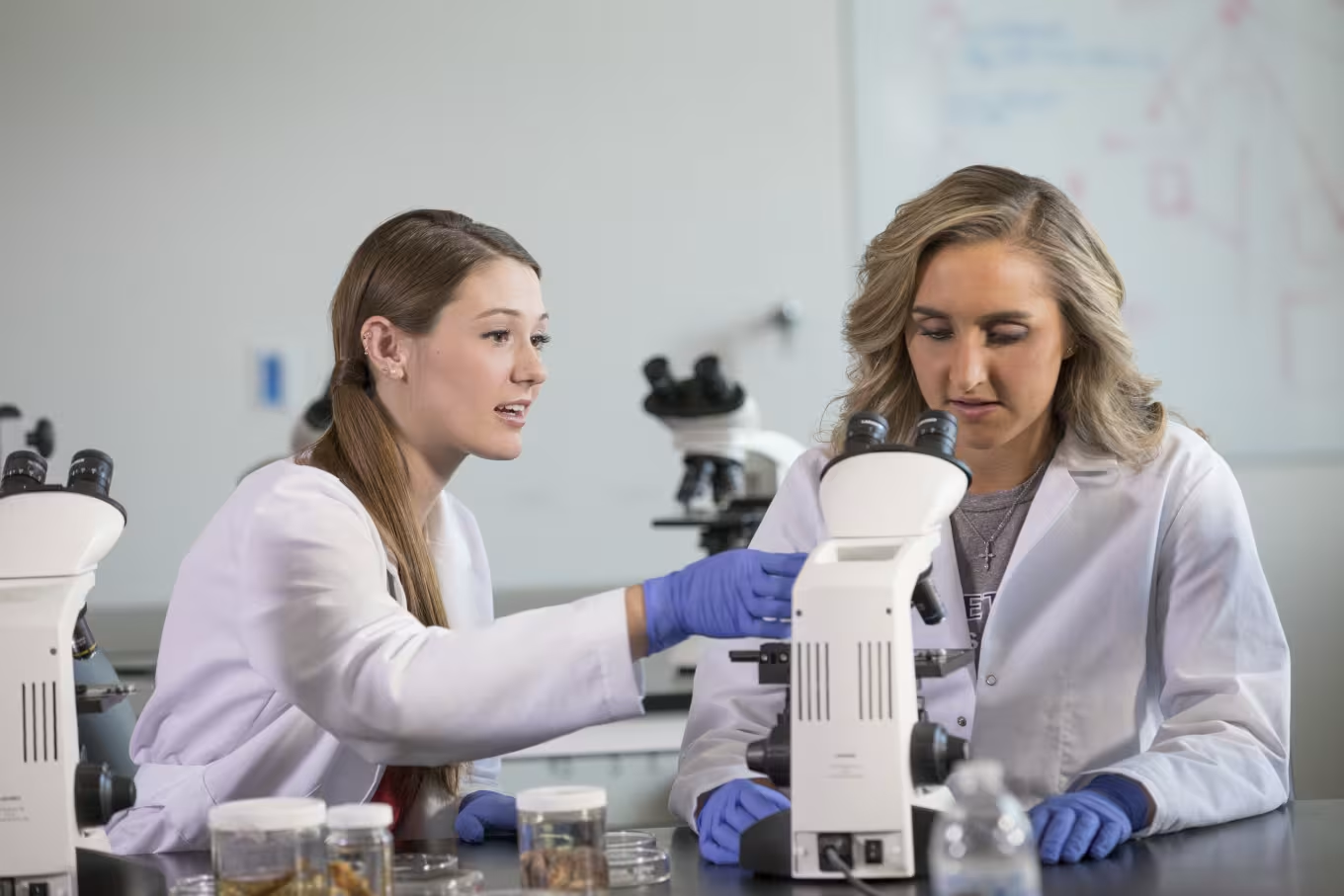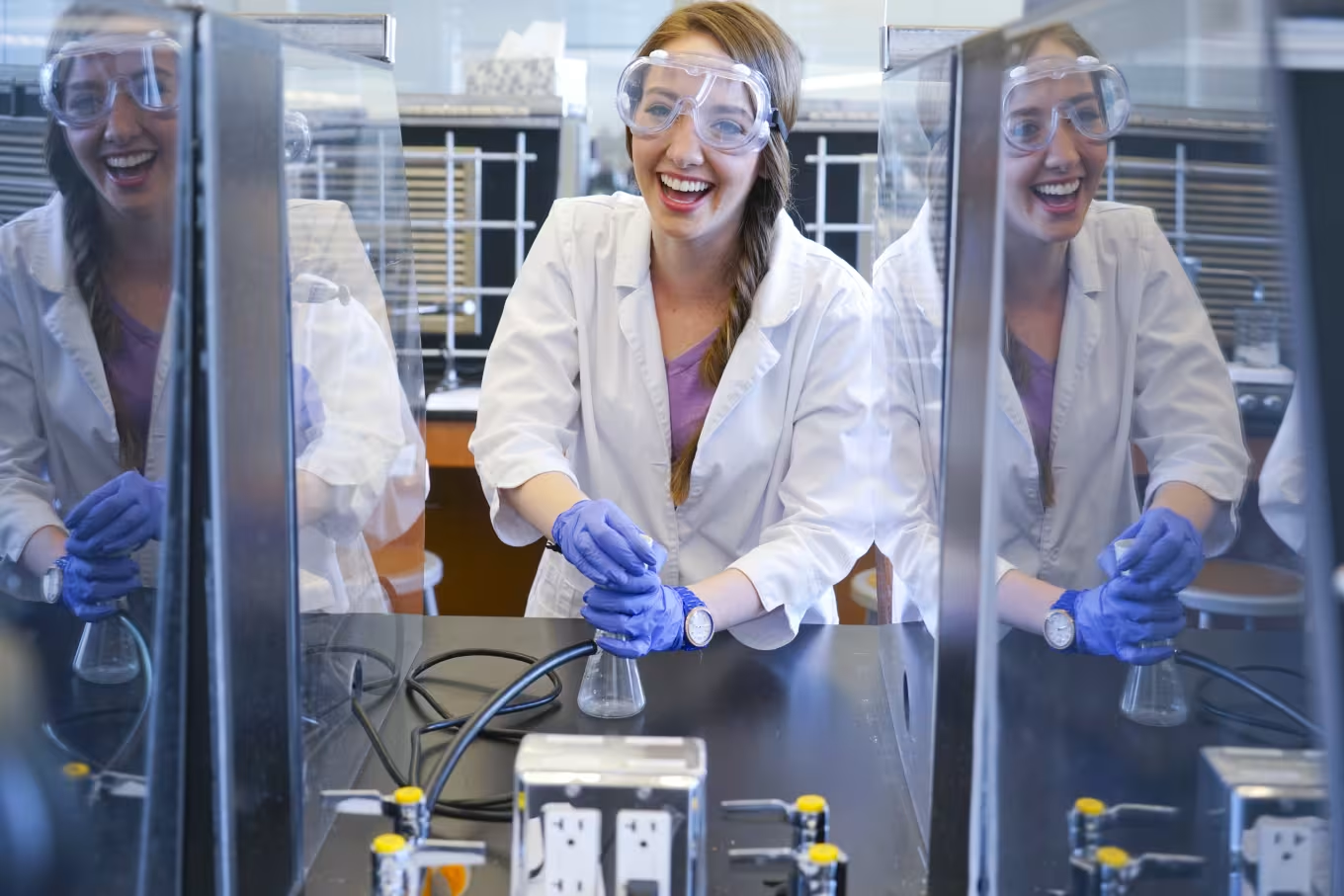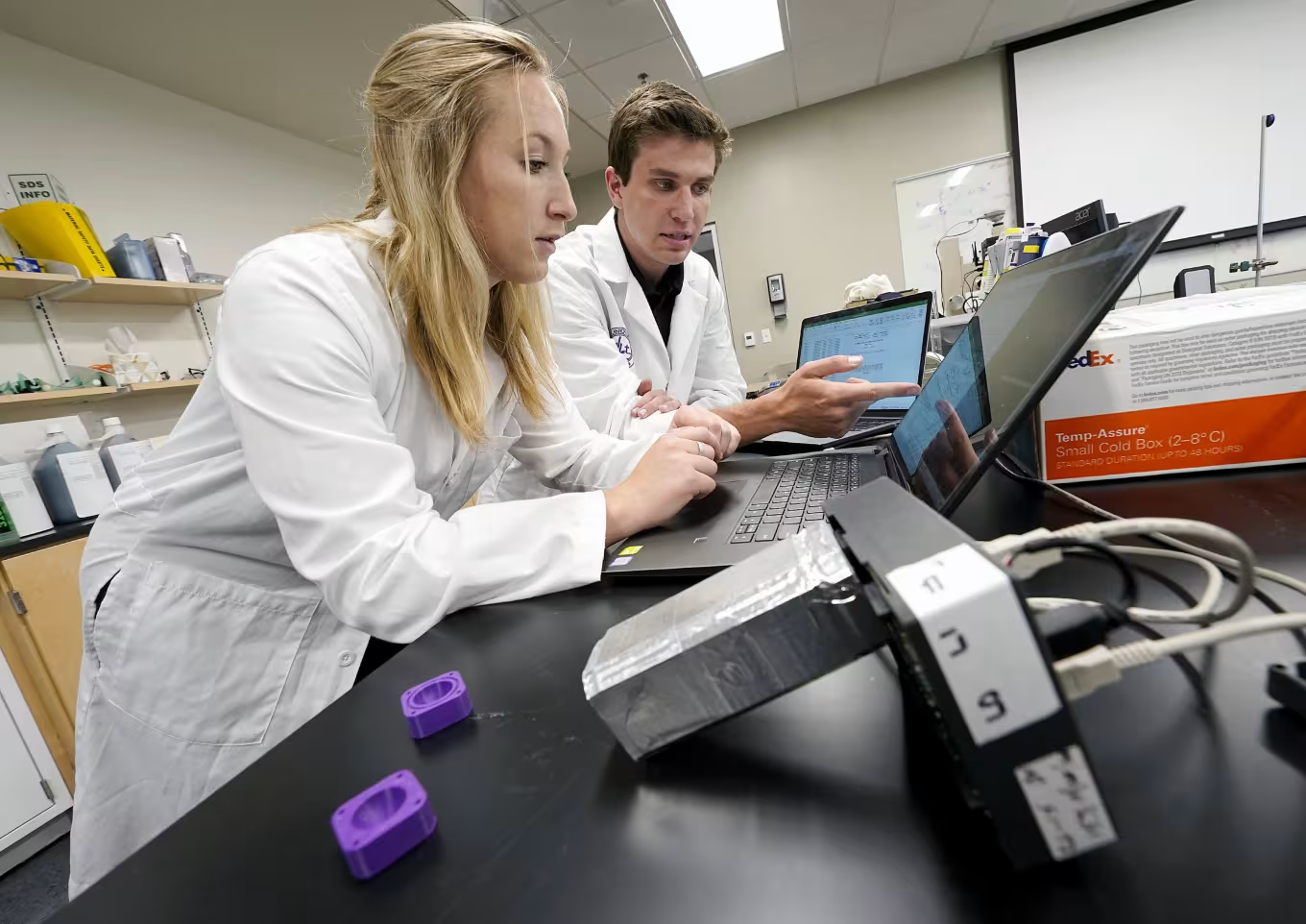Bachelor’s Degree in Environmental Science

Bachelor’s Degree in Environmental Science
journey today.

We're here to help.
GCU is proud to be institutionally accredited by the Higher Learning Commission, an indication of our commitment to providing quality education to our students. The College of Natural Sciences shares the university’s commitment to upholding the principles and standards established by our accrediting bodies.
1 U.S. Bureau of Labor Statistics. (2024, Aug. 29). Environmental Scientists and Specialists: Work Environment. Occupational Outlook Handbook. Retrieved Oct. 14, 2024.
2 The earnings referenced were reported by the U.S. Bureau of Labor Statistics (BLS), Environmental Scientists and Specialists as of May 2023, retrieved Oct. 14, 2024. Due to COVID-19, data from 2020 to 2023 may be atypical compared to prior years. BLS calculates the median using salaries of workers nationwide with varying levels of education and experience. It does not reflect the earnings of GCU graduates as environmental scientists and specialists, nor does it reflect earnings of workers in one city or region of the country or a typical entry-level salary. Median income is the statistical midpoint for the range of salaries in a specific occupation. It represents what you would earn if you were paid more money than half the workers in an occupation, and less than half the workers in an occupation. It may give you a basis to estimate what you might earn at some point if you enter this career. Grand Canyon University can make no guarantees on individual graduates’ salaries. Your employability will be determined by numerous factors over which GCU has no control, such as the employer the graduate chooses to apply to, the graduate’s experience level, individual characteristics, skills, etc., against a pool of candidates.
3 COVID-19 has adversely affected the global economy and data from 2020 to 2023 may be atypical compared to prior years. Accordingly, data shown is effective September 2024, which can be found here: U.S. Bureau of Labor Statistics, Occupational Outlook Handbook, Environmental Scientists and Specialists, retrieved Oct. 14, 2024.
Campus: $8,250 per semester [More Info]
Up to 90 credits, only 84 can be lower division
Credits: Fill out the Lopes Eval to find out what will transfer
Admission Requirements (Bachelor's)
OR 2.5+ Unweighted GPA and
Admission requirements may differ based on degree level, program and modality, or transfer status. Some programs of study may require a higher GPA and/or other qualifying criteria for admission. Please review full admission and program requirements in the University Policy Handbook.
*Math and reading only on a 1600 point scale (test date after 3/1/2016). SAT score of 1380 required for 2400 point scale (test date before 3/1/2016).
With a solid academic background in conservation, you may decide to pursue any number of potential career choices. Some students may begin an environmental science-related position right away, while others may opt to further their academic studies with graduate coursework in order to specialize further in their field.
Graduates may pursue work as:
Environmental science professionals may pursue work in various settings, including local, state and federal government agencies, engineering firms and scientific consulting services.1
Median annual wage of environmental scientists and specialists as of May 2023.2
Environmental risk assessment, field and laboratory analysis and remediation strategies are at the heart of this degree program. GCU aims to graduate professionals who are capable of applying research-driven strategies designed to protect and remediate ecosystems in a way that is also mindful of human health.
As you work toward degree completion, you will be expected to demonstrate the following outcomes:
Professionalism and ethics, being mindful of the historical, social & legal aspects of the industry
Ability to think critically about current research and communicate findings
Understanding of relevant environmental and human health regulations
Ability to apply laboratory and field techniques for environmental assessment and remediation
Environmental risk assessment competencies
This degree program focuses on teaching versatile skills, such as the application of critical thinking to various situations, refinement of problem-solving strategies and use of effective communication with stakeholders. You will be exposed to the latest technologies and tools used in the environmental science field. Your access to laboratory facilities and equipment can enable you to conduct experiments and research projects under the guidance of experienced faculty members.
Explore timely topics in environmental challenges, environmental health and remediation. Be prompted to engage in responsible environmental stewardship using the principles of social and ecological responsibility with natural resources. Coursework includes both lectures and lab courses to provide opportunities to develop a deep understanding of scientific theory and how to apply it in practical settings.

The Bachelor of Science in Environmental Science at Grand Canyon University is a degree program designed to prepare you to tackle some of the world's most pressing environmental challenges, such as climate change, pollution and other environmental issues.
The College of Natural Sciences aims to graduate well-rounded professionals who are comfortable with inquiry, research and practical methodology. A degree in environmental science can be a good fit for students who are passionate about the environment and are looking to make a positive impact on our planet's future.

To demonstrate the skills needed to matriculate into an environmental science career, you will be expected to complete a capstone project. The project includes an extensive written scientific report or proposal based on your personal research and/or industry experiences, often in partnership with an outside agency/organization. Course content and scientific practice knowledge are integrated into the project.
Browse through our list of frequently asked questions and answers to get all the information you need about becoming an environmental science major.
A degree in environmental science can lead to a variety of career paths, including roles in government agencies, private consulting firms and engineering services. You might work both in the field and in laboratories and offices, and you might sometimes travel to meetings or professional conferences.1 This degree could be the right fit for you if you are passionate about environmental issues.
A BS in Environmental Science degree can be worth it for you if you have a strong interest in environmental issues and want to make a positive impact on the world. As an interdisciplinary field, environmental science typically combines elements from several different scientific disciplines, including biology, chemistry, physics and geology. If you are interested in environmental issues, enjoy interdisciplinary topics and want to pursue a career in a growing field with a positive impact, then this degree may be a good choice for you. According to the U.S. Bureau of Labor Statistics (BLS), the job growth rate for environmental scientists and specialists is estimated to be 7% from 2023 to 2033.3
Environmental science can be a challenging major, as it involves complex scientific systems and interdisciplinary approaches to solving environmental problems. You may be expected to complete hands-on research projects and fieldwork. To set yourself up for an environmental science program, it can be helpful to be highly proficient at science and math and be willing to work hard to develop your critical thinking, problem-solving and communication skills.
You can earn your Bachelor of Science in Environmental Science via on-campus courses. Our campus is an oasis in the heart of the desert in Phoenix. Our campus life offers countless opportunities for recreation, social get-togethers, intramural sports and student clubs. You’ll also have access to regular and ongoing worship services on our Christian campus. Prepare to become a responsible steward of the environment under the guidance of knowledgeable faculty members.
Available Environmental Chemistry Emphasis

Pursue your passion for protecting the environment and promoting responsible practices.